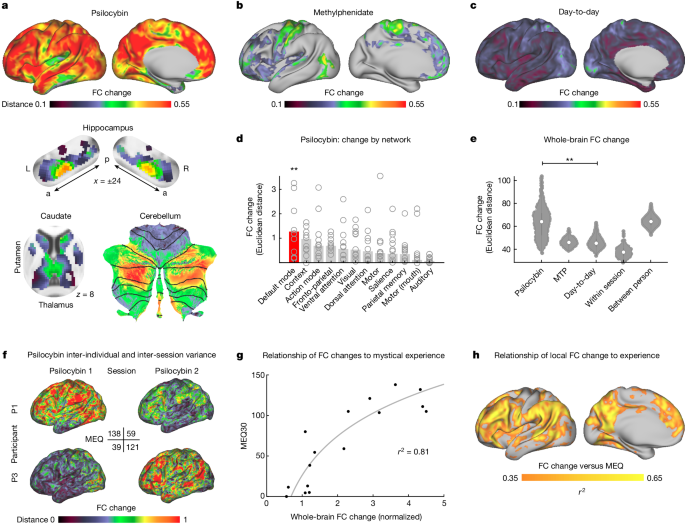Time: 2024-07-19

Psilocybin , the active substance in magic mushrooms , has been the focus of a recent study conducted by Dr. Nico Dosenbach , an associate professor of neurology at Washington University School of Medicine in St. Louis . In this study , Dosenbach and six other participants were given high doses of psilocybin to understand how this psychedelic drug impacts the brain . The results of the study , published in the journal Nature , revealed that psilocybin disrupts specific brain networks , particularly those involved in forming a sense of space , time , and self.
The study involved scanning the participants ' brains multiple times over a three - week period , with some individuals repeating the experiment six to 12 months later . The scans showed swift and dramatic changes in certain brain networks when under the influence of psilocybin . Normally synchronous populations of neurons became desynchronized , leading to the brain " falling apart . " This desynchronization triggered a state of enhanced plasticity in the brain that could last for weeks.
The disruption of brain networks caused by psilocybin offers insights into the potential therapeutic benefits of psychedelic drugs for conditions such as addiction , depression , and post - traumatic stress disorder . Dr. Petros Petridis of New York University 's Langone Center for Psychedelic Medicine believes that the increased change observed in the brain during and after a psilocybin experience could be leveraged by therapists to help patients reframe their relationships with substances or emotions.
However , the use of psychedelic drugs is not without risks . Dr. Ginger Nicol , a psychiatrist at Washington University , shared that her husband , a participant in the study , had varying experiences with psilocybin , ranging from religious revelations to encountering demons . Despite the potential risks , Nicol believes that psychedelics could offer a novel approach to helping patients recognize their capacity for change and recovery.
The study conducted at Washington University in Saint Louis followed strict regulatory guidelines and ethical standards . All participants provided written informed consent , and the study was approved by various institutional review boards and regulatory bodies . Psilocybin was provided by the Usona Institute through Almac Clinical Services , and the drug sessions were facilitated by trained clinical research staff.
The study design involved healthy young adults who underwent precision functional brain mapping before , during , and after psilocybin exposure . MRI imaging sessions were conducted to evaluate changes in individual - level connectomics and assess the acute psychological effects of psilocybin . The research aimed to understand how psilocybin alters brain networks and neurovascular coupling , shedding light on the mechanisms underlying the psychedelic effects of the drug.
In addition to investigating the immediate effects of psilocybin on the brain , the study also looked at persistent changes in brain connectivity months after the drug exposure . By comparing FC changes before and after psilocybin administration , researchers identified regions , such as the anterior hippocampus , with lasting alterations in connectivity . These findings could have implications for understanding the long - term impact of psychedelic drugs and their potential therapeutic applications for mental health conditions.
Overall , the study provides valuable insights into how psilocybin affects the brain , highlighting the importance of understanding the neural mechanisms underlying the mind - altering effects of psychedelic substances . The research opens up new possibilities for utilizing these drugs in therapeutic settings , albeit with caution due to the variability in individual experiences and potential risks associated with their use.